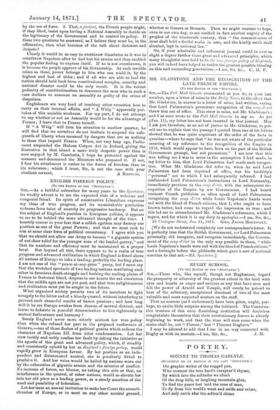MR. GLADSTONE AND THE RECOGNITION OF THE LATE FRENCH EMPIRE.
(TO THE EDITOR OF THE "SPECTATOR."] Sin,—The Pall Mall Gazette commented as you do, in your last number, upon a letter of mine to the Daily News, to the effect that Mr. Gladstone, in answer to a letter of mine, had written, saving that Lord Palmerston's premature recognition of the coup d'etat threw him out of office. This error is mine, not Mr. Gladstone's ; and I at once wrote to the Pall Mall Gazette to say so. As yet (Jan. 11), my letter has not been inserted in that journal. May I ask you therefore, as an act of justice to Mr. Gladstone, to per- mit me to explain that the passage I quoted from one of his letters showed that he was quite cognizant of the order of the facts in question—where he says that " he was not aware of the particular meaning of my reference to the recognition of the Empire in 1832, which would appear to have been on the part of the British Government prompt, but not premature." I see now that this was telling me I was in error in the assumption I had made, in my letter to him, that Lord Palmerston had made such recogni- tion. What Mr. Gladstone did refer to, when ho said Lord Palmerston had been deprived of office, was his lordship's " personal" act to which I had subsequently referred. I had confounded Lord Pahnerston's instructions to Lord Normanby, immediately previous to the coup dVtat, with the subsequent re- cognition of the Empire by our Government. I had heard eminent French publicists so often speak of Lord Palmerston recognizing the coup d'e'lat while Louis Napoleon's hands were red with the blood of French citizens, that I, who ought to have known better, had come to regard the impression as true ; and this led we to misunderstand Mr. Gladstone's references, which I regret, and for which it is my duty to apologize.—I am, Sir, &c., 20 Cockspur Street, Jan. 11, 1871. GEO. JACOB HOLYOAKE.
[We do not understand completely our correspondent's letter. It is perfectly true that the British Government, not Lord Palmerston personally, did recognize, and recognize immediately, the Govern- ment of the coup d'dtat in the only way possible to them, " while Louis Napoleon's hands were red with the blood of French citizens," and a fortnight before the plebiscite which gave a sort of national sanction to that act.—Ed. Spectator.]


































 Previous page
Previous page